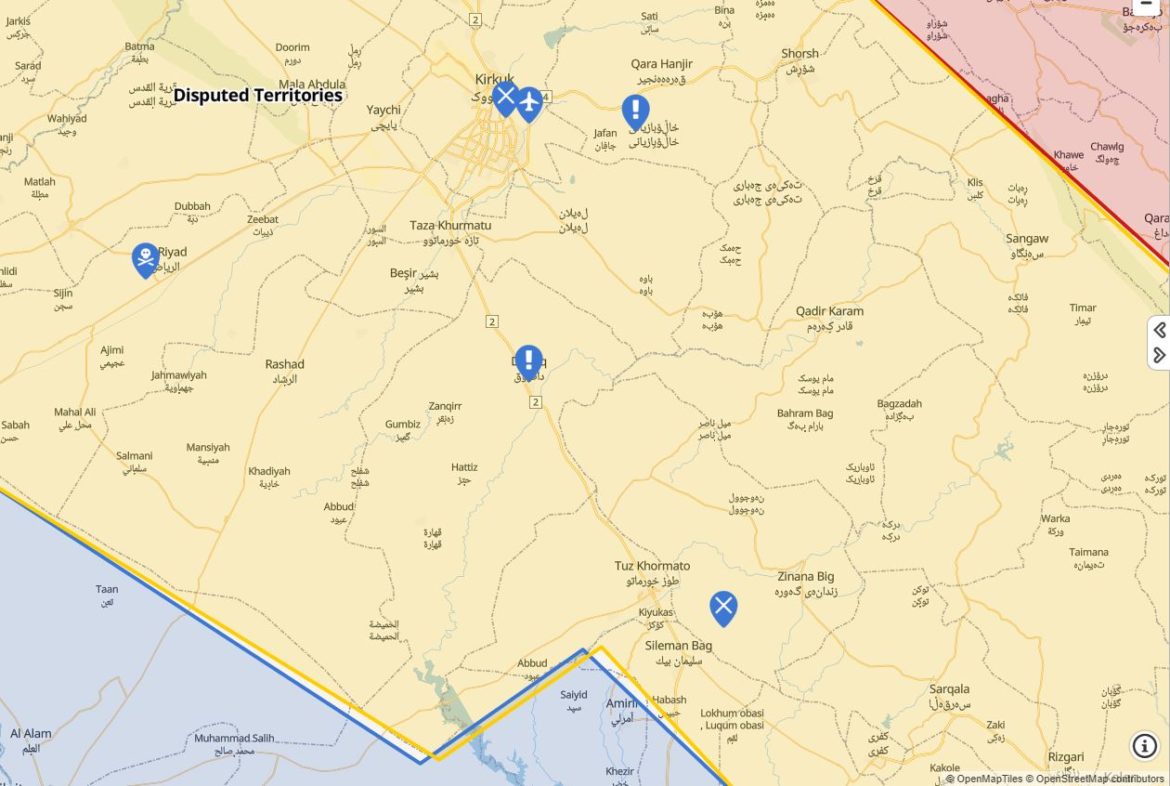1.3K
A weekly brief of events and news occurred in the disputed territories.
Kirkuk
- On January 24, Kurdish lawmakers called on the people of Daquq district to protest against the appointment of a new Arab mayor named Saadoun Hammadi Majid in the district by the acting governor of Kirkuk Rakan al Jabouri. The reactions of planned protests echoed in Baghdad, leading prime minister Mohammed Shia’ Al Sudani to intervene and annul the decision. Dilan Gafour, a Kurdish lawmaker, announced the cancellation of the demonstration since the issue was “solved” for now. Gafour also revealed that only two of the mayors for the province’s districts are Kurds, while the twelve others are non-Kurds. Hundreds of posts and government positions have been stripped from Kurds since October 16, 2017.
- On January 21, several gunmen from inside a vehicle opened fire on the house of Shukriya Kazim, the principal of a Kurdish studies school named “Mother School” in the Latif Awa neighborhood. The attacks caused property damage, but the security forces have not yet clarified the motive of the attackers. Three more similar assaults targeted directors of Kurdish schools since the beginning of the school year. Separately, the Kirkuk administration demolished 22 Kurdish homes in the same neighborhood for being “illegally built.” At the same time, dozens of illegal homes have been built in non-Kurdish areas in the province.
- The 11th Division of the Iraqi Army will be sent from Baghdad to Kirkuk to replace the federal police forces in the south and east of the province. The 11th Division of the Iraqi army, commanded by Lieutenant Colonel Mu’ad Badai Faraj Daraji, was previously responsible for guarding the Rassafa front, and most of its soldiers are from Baghdad. Since October 16, 2017, the Iraqi government has militarized Kirkuk after removing Kurdish forces in response to the independence referendum held in Iraqi Kurdistan.
- On January 25, the Kirkuk Police Directorate announced that for the first time in the history of the city’s police, a surveillance drone was put into operation. According to the statement, drones are one of the most advanced surveillance resources used to chase fugitives and detect targets, and they are equipped with IR and thermal imaging. Baghdad’s plans to hand the security file to local police are ongoing, but Kirkuk’s acting governor is against it.
- On January 21, a cell of ISIS (Da’esh) terrorists raided the Sharafia village in the subdistrict, attempting to kidnap two sons of the head of the village (Mokhtar). Villagers resisted the terrorists, killing one after clashes and before the security forces arrived. According to security forces, the deceased terrorist is a local from a nearby village.
Tuz Khurmatu
- On January 20, Iraqi forces launched a large-scale air and infantry operation against the Zinana and Dawe areas of Tuz Khurmatu. Initially, warplanes intensively bombed the Qompalik and Rashid Awa villages for two days. On January 22, Special Forces conducted an infantry operation to clear the area. The security forces claimed it had destroyed twelve Da’esh hideouts and ‘neutralized’ four terrorists. The region has seen Da’esh activities since 2017, when the federal government removed the Peshmerga forces.
Shingal (Sinjar)
- On January 26, the Iraqi prime minister’s office said French Prime Minister Elizabeth Bourne signed a memorandum of understanding between France and Iraq. According to the statement, France will play a role in the reconstruction and development of Sinjar, especially in the fields of culture and health. The Yazidi areas remain in a dire humanitarian situation. Last week a fuel crisis broke out, causing a massive gasoline, diesel, household gas, and kerosene shortage.

